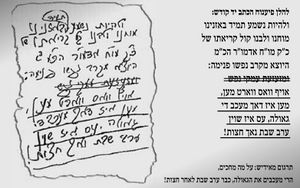Geulah - Redemption
Geulah is the liberation and salvation of a person or group from distress, servitude, or exile.
Geulah in Judaism[edit | edit source]
In the Tanach, there are many expressions of the concept of geulah: release of lands from servitude to another person[1], deliverance from distress[2], redemption of agricultural produce from the sanctity of tithes[3], ending widowhood, salvation from death, and similar themes.
Redemptions in the Days of Israel[edit | edit source]
Geulat Mitzrayim (also known as Yetziat Mitzrayim, the Exodus from Egypt) was a process that occurred in the year 2668 from creation (1312 BCE), during which the Children of Israel left the land of Egypt after 210 years of servitude[4].
On the night of the 15th of Nissan during the Seder night, there is a mitzvah to tell the story of the redemption and the ten plagues that preceded it, in addition to the mitzvah of remembering the Exodus which is recited every day during prayer and is even mentioned at night.
This redemption from Egypt was not perfect since additional exiles followed, but it is still considered the primary redemption, since it was the first one that opened the channel for all redemptions that came after it.
Personal Redemption[edit | edit source]
According to Chassidic teachings, a person in this world is in a personal exile, with their divine soul imprisoned by the animal soul. Mitzrayim comes from the word "meitzar" (constraint) and limitation. A person must leave Mitzrayim, breaking free from their personal material limitations and connect to Hashem through fulfillment of Torah and mitzvot.
This redemption must be experienced every day, as a person can break through new boundaries each day. As the Alter Rebbe brings in the Tanya, "In every generation and every day, a person must see himself as if he personally left Egypt today[5]."
This departure particularly occurs during the acceptance of the yoke of Heaven in the recitation of Shema, when one accepts Hashem's unity by saying "Hashem Elokeinu Hashem Echad." For this reason, the Sages established the passage about the Exodus during the Shema, even though remembering the Exodus is a separate mitzvah.
The True and Complete Redemption[edit | edit source]
Although the concept of "redemption" refers to several types of redemption, a special place and special reference is given to the redemption of the Jewish people in the Tanach, the Oral Torah: Jerusalem Talmud, Babylonian Talmud, in ancient Midrashim, and in the two central mystical works: the Zohar, and the Etz Chaim written by Rabbi Chaim Vital, the student of the holy Arizal.

The anticipation for the redemption of the Jewish people is one of the main obligations in Judaism, and was even established in Jewish law as a mitzvah of service of the heart, meaning in prayer, which was instituted by the Men of the Great Assembly: the Shemoneh Esrei prayer. It was also mentioned as the 12th of the 13 Principles of Faith by the Rambam. The concept of redemption is based on faith in Hashem's attributes, His unlimited ability, His righteousness, and His mercy.
The Rambam proves the redemption from verses in Tanach: "And Hashem your G-d will return your captivity and have compassion on you, and will return and gather you from all the nations where Hashem your G-d has scattered you." Even Bilaam prophesied about the King Moshiach, who will appear: "I shall see him, but not now; I shall look at him, but it is not near; a star has gone forth from Jacob, and a staff will arise from Israel." Additional proof comes from the section on cities of refuge, where it is written about the day when Hashem will expand the borders of the Land of Israel, and therefore they will add three more cities of refuge. The books of the Prophets are also filled with prophecies and descriptions of the Messianic era.
After this redemption, no more exiles will occur, and therefore this redemption is called 'the true one,' since truth is something eternal that does not change. In this redemption, all the Jewish people will be redeemed without exception, unlike previous redemptions in which only parts of the nation were redeemed. Therefore, this redemption is called 'the complete one,' as it will be done in completeness and Moshiach will gather all the dispersed of Israel.
References[edit | edit source]
- ↑ Vayikrah: 25
- ↑ Bereishis: 48
- ↑ Vayikrah: 27
- ↑ Even though in the Torah it is written that the Children of Israel served for 430 years, Rabbi Elazar ben Azaria explains that this number includes the five previous years in which Menashe and Ephraim were born, and since the Children of Israel worked day and night - each day is counted as two days.
- ↑ The Alter Rebbe in Sefer HaTanya Chapter 37
